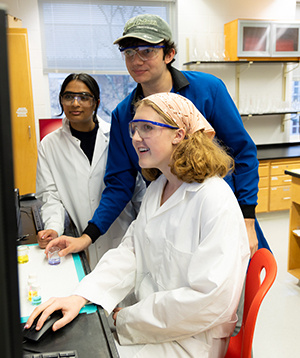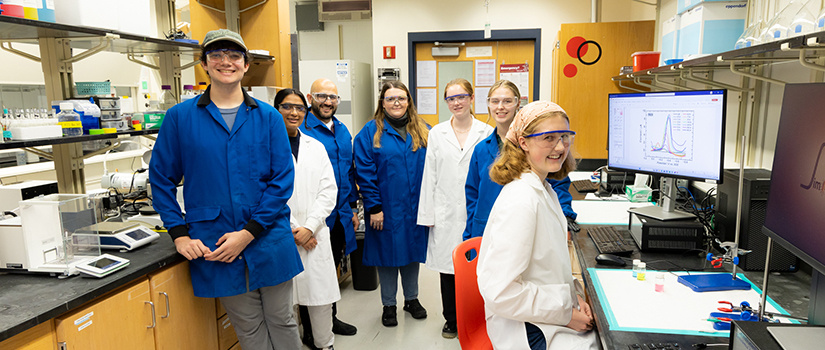As a biochemistry major at the University of South Carolina, Joseph Budiselich wanted to get involved in research as soon as possible. But he didn't expect to find such an opportunity even before his first class.
“It was actually at orientation that I learned about this new program where freshmen get to learn how to work in a lab and then get placed in a research internship,” says Budiselich, who jumped at the opportunity to apply.
He’s one of the first to participate in the Undergraduate Research Initiative, launched in Fall 2023 by the Department of Chemistry and Biochemistry.
In the program, students spend a semester learning the basics of chemistry and how to work in a laboratory, from experimental methods to general etiquette in the lab setting. In addition to a weekly lecture, the students attend labs to conduct experiments and practice their skills.
Applying what we’ve learned in class in the lab is so rewarding, especially when we use it to solve real-world problems.
Jessica Bunge, first-year chemistry major
At the end of the semester, students learned about different lab groups on campus and ranked their top choices. For his internship, Budiselich was placed in chemistry professor Aaron Vannucci’s lab.
“We put complex organic catalysts into a solution that’s almost like cement,” Budiselich says. “That makes it so these molecules can’t move during the reaction, which helps us get as much product as possible.”
Budiselich says he hopes to someday work in research, possibly in industry applications, which makes his experience in Vannucci’s lab a valuable first step toward his future career.
This is exactly what chemistry professors Olja Simoska and Amir Hosseini had in mind when they developed the initiative.
“This opportunity can play a pivotal role in guiding students to discover their passion for research early in their college careers, with some already expressing interests in pursuing graduate degrees in chemistry," Hosseini says.
The application process is competitive, with most students coming in with a solid foundation of high school chemistry, but it isn’t limited to only those with their sights set on a career in chemistry.
“The program attracts capable student populations who might not have otherwise considered research as a goal,” Simoska says.
For premedical student Aarya Patel, joining the Undergraduate Research Initiative was a way to sharpen her skills in chemistry and biochemistry, which she’ll use to succeed in medical school and in her career as a doctor.
“When I met with my biochemistry advisor for my major, she brought up URI as a good option for me,” Patel says. “Being able to learn the equipment, the methods and techniques — all as early as freshman year— I was definitely interested.”

Patel is now working in chemistry professor Sheryl Wiskur’s lab, where she’ll be helping make monomers and polymers that can aid in the large-scale production of pharmaceuticals.
“This lab was one of my top choices because of how it connects chemistry and biochemistry,” she says. “But there were a few others that had medical applications as well, like the Simoska lab, which looks at human physiology to create equipment for health monitoring.”
Freshman Jessica Bunge, who was placed in Simoska’s lab, says doing research has become her favorite part of her chemistry major.
“Applying what we’ve learned in class in the lab is so rewarding, especially when we use it to solve real-world problems,” she says. “So far, I have prepared bacteria samples and made electrodes, which I had never done before.”
Simoska and Hosseini say the hands-on, experiential nature of the coursework has led the participants to rapidly master the lab techniques they learned, from fluorimetry to spectroscopy and more.
It’s a promising beginning for the Undergraduate Research Initiative, which may eventually include internships in additional departments.
“The initial year of this program began on a modest scale, but we've witnessed remarkable success in the students' performance within the labs,” Simoska says. “We hope to expand the program to include even more students in years to come.”
Banner: (From left to right) Joseph Budiselich, Aarya Patel, Amir Hosseini, Olja Simoska, Maeve Lembke (first-year URI student), Olivia Clay (URI graduate mentor) and Jessica Bunge.
